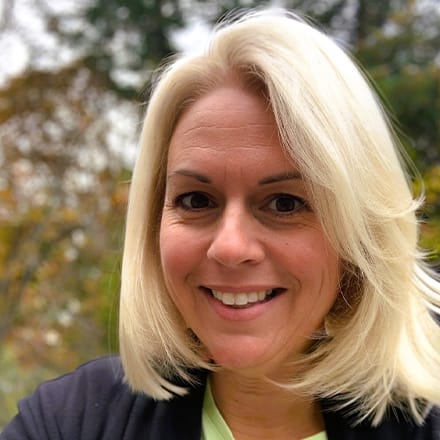What is Creative Writing?

Understanding the numbers
When reviewing job growth and salary information, it’s important to remember that actual numbers can vary due to many different factors—like years of experience in the role, industry of employment, geographic location, worker skill and economic conditions. Cited projections are based on Bureau of Labor Statistics data, not on SNHU graduate outcomes, and do not guarantee actual salary or job growth.
Creative writing is any form of writing that exists outside of journalism, business writing or academic writing. It expresses an author's unique voice, writing style, thoughts and ideas in an engaging and imaginative manner, said Christopher Sullivan, MFA, an adjunct instructor in the creative writing and English program at Southern New Hampshire University (SNHU).
“Creative writing has no boundaries," he said. "It gives the writer permission to flex his or her creative muscles and utilize infinite amounts of imagery and imagination within their writing."
What Are the Main Types of Creative Writing?
The two broad categories of creative writing are poetry and prose, according to Paul Witcover, an associate dean of the online Master of Fine Arts in Creative Writing program at SNHU.
Poetry uses language and structure to create mental imagery and evoke emotion in readers. This includes poems with structured meter and rhyme, unstructured forms of free verse and hybrid forms such as song lyrics, Witcover said.
Prose is used to tell stories through narration using sentences and paragraphs. Many types of creative writing fall under the category of prose, including:
- Novels. When you think of creative fiction writing, a novel might be what first comes to mind. Novels are longer works, typically spanning 250-400 pages, according to Jeremy Flagg, a dystopian and sci-fi novelist and adjunct faculty member in the online creative writing and English program at SNHU. Novels use characters, settings and plots lines to create compelling stories.
- Short stories. These self-descriptive works are much like novels, but abbreviated. Short stories are works of fiction with simplified characters and settings that take you through quick narrative arcs — often in a single sitting.
- Memoirs. Memoirs recount actual events of an author’s life from their perspective. This form of creative nonfiction goes beyond a retelling, often challenging readers to take action or make change.
- Personal essays. Like memoirs, personal essays reflect on an author's own thoughts and experiences. Through personal storytelling, the writer connects with readers emotionally, asking them to explore certain themes and consider new viewpoints on topics.
- Scripts. Whether for plays or movies, scripts outline plot and dialogue, providing directors and actors with information they need to convey a narrative to the audience.
- Copywriting and blogs. Creative writing extends beyond typical ideas of artistry. In areas such as advertising and marketing, copywriting and blogging require writers to engage in creative storytelling to help sell products and ideas.

"Most of the writing we encounter on a daily basis is concerned with communicating facts and ideas," Witcover said. "And that is true of creative writing as well. But in addition, creative writing is interested in communicating emotions, sensations, transcendent and perhaps even ineffable qualities of experience that can nevertheless be approximated or suggested through the manipulation of language."
Learn more about the types of literary genres.
Why Get a Creative Writing Degree?
Creative writing programs help writers build upon their foundational skills. Many creative writing majors take English composition classes that utilize a variety of rhetorical modes (narration, description, cause and effect, and persuasion and argument, to name a few) that help them perfect their skills before they focus on a specific genre, Sullivan said. In addition to teaching courses in creative writing and screenwriting, Sullivan is an English composition instructor.
“Most students interested in applying to the creative writing program typically have a solid foundation with writing mechanics," he said. "However, that doesn’t mean their mechanics have to be perfect — they are here to learn."

Pursuing a graduate-level degree, such as the Master of Arts (MA) or Master of Fine Arts (MFA) in Creative Writing and English, can further instill a strong understanding of genre writing and support development of your unique voice, said Frank Sennett, a fiction instructor in the SNHU online MFA program.
"What I most love about the creative writing track is that it helps students understand and start to form their own communities of writers," he said. "It shows them the benefits of reading widely and deeply as a way to support development of their voice and craft."
Aside from teaching, Sennett is an accomplished writer who has published 11 books. His most recent novel, "Shadow State" (Crooked Lane Books, 2023), was named Best New Novel by a Chicagoan by the Chicago Reader.
Overall, master's-level creative writing programs, such as those offered by SNHU, help give aspiring writers a surer grasp of the craft. According to Witcover, this includes:
- Character development
- Diction and syntax
- Pacing
- Plot
- Point of view
"We also strive to teach something about the professional side of things," he said. "How to find an agent. How to develop an online presence. How to work with an editor or even become an editor yourself."
Witcover has a Master of Arts in Creative Writing from the City College of New York and is a graduate of the Clarion Writers’ Workshop. Beyond teaching at SNHU, Witcover is a published novelist and short story writer himself. He has been a finalist for the Nebula, World Fantasy and Shirley Jackson awards and is a recipient of a Hawthornden Fellowship.
Find Your Program
What Can I Do With a Creative Writing Degree?

While getting a degree in creative writing doesn't guarantee you'll become a published author, a good program will give you the tools you need to pursue your goals. Graduates who are serious about pursuing creative writing careers are encouraged to practice their craft, obtain feedback and submit their work to publishers, Sullivan said.
“Throughout the creative writing program, students are given tools, resources and lots of valuable feedback to strengthen their writing skills,” he said. “However, writing is a process. It takes a lot of hard work, networking, humility and dedication to become a published author.”
Creative writing and English degree programs also help you build strong writing and communication skills that can be translated into a variety of industries and roles, including:
- Advertising and marketing
- Content creation and podcasting
- Grant writing
- Publishing
- Teaching
"In general, writing degrees can support students in any career that places a premium on highly developed communication skills," said Sennett. "When you think about it, narrative — the stories we tell to describe the world — helps make the world go round."
What Jobs Can I Get With a Creative Writing Degree?
With a bachelor's degree in creative writing and English, you can polish your storytelling skills and position yourself for a variety of jobs that require imagination and solid communication skills.

"A creative writing degree would be helpful in just about any job in the publishing industry," Witcover said. "Beyond that, the storytelling skills one learns in earning a creative writing degree have wide application."
Here are some jobs creative writing and English majors might consider pursuing:
Writer or Author
Use your storytelling skills to pen children’s books, novels, biographies, essays or memoirs. A bachelor’s degree is generally required for a full-time position as a writer or author, according to the U.S. Bureau of Labor Statistics (BLS), and additional experience gained through internships or any writing that improves skill — such as blogging — can help, too.
Writers and authors earned a median salary of $72,270 in 2024, according to BLS.*
Editor
Editors aren’t just grammar experts who correct mistakes. Publications rely on them to plan, review and evaluate publications. Whether they work in a corporate environment or for print or digital publications, editors must be imaginative, curious and knowledgeable in a broad range of topics in order to add value.
Most editors have a bachelor’s degree, according to BLS, and, in 2024, they earned a median salary of $75,260.*
Journalist
![]() Reporters, news correspondents and broadcast news analysts use their research and storytelling skills to inform the public about news and events. They can work for news publications, digital publications, TV or radio stations.
Reporters, news correspondents and broadcast news analysts use their research and storytelling skills to inform the public about news and events. They can work for news publications, digital publications, TV or radio stations.
Journalists typically hold a bachelor’s degree and gain experience through their college newspaper or radio station, BLS reported. The median wage for news analysts, reporters and journalists was $60,280 in 2024, according to BLS.*
Advertising, Promotions or Marketing Manager
Whether they are creating ad campaigns, promotional events or looking at pricing strategies, professionals in advertising and marketing roles use their creativity and communication skills to generate interest in their organization’s products or services.
A bachelor’s degree is required for most advertising, promotions and marketing management positions, according to BLS. A creative writing degree can be particularly helpful to media directors who use radio, television, newspapers, magazines, the internet or outdoor signs to create messages that effectively reach customers.
BLS reported that the median salary for advertising, promotions and marketing managers was $159,660 in 2024.*
Post-secondary Teacher
![]() Become a full-time professor at a local university or teach classes online as a side gig with a master's in creative writing. Creative writings instructors have a variety of responsibilities, which may include planning curricula, giving lectures, leading discussions, and editing, grading and giving feedback on student writing.
Become a full-time professor at a local university or teach classes online as a side gig with a master's in creative writing. Creative writings instructors have a variety of responsibilities, which may include planning curricula, giving lectures, leading discussions, and editing, grading and giving feedback on student writing.
According to BLS, post-secondary teachers earned a median annual salary of $83,980 in 2024.*
"Many students in my creative writing courses share that they are pursuing the degree as a path into college teaching," Sennett said. "Since an MFA is a terminal degree, that can work well. It was a secondary reason why I pursued my own MFA way back when."
So, whether you're working on a manuscript of your own or want to help other writers or organizations better tell their story, creative writing is a discipline that can benefit a number of industries.
Discover more about SNHU's online bachelor’s in creative writing: Find out what courses you'll take, skills you'll learn and how to request information about the program.
*Cited job growth projections may not reflect local and/or short-term economic or job conditions and do not guarantee actual job growth. Actual salaries and/or earning potential may be the result of a combination of factors including, but not limited to: years of experience, industry of employment, geographic location, and worker skill.
Krysten Godfrey Maddocks ’11G is a writer who covers K-12 and higher education topics, including policy and the role of digital technology in education. She spent almost a decade working in various marketing roles at an educational assessment company before launching a strategic marketing company. Maddocks earned a master's degree in marketing from Southern New Hampshire University and a bachelor's degree in English/ journalism from the University of New Hampshire. Connect with her on LinkedIn.
Explore more content like this article

Debut Novelist Haley-Grace McCormick on Learning, Writing and Dyslexia

What is a Liberal Arts Degree and What Can You Do With It?

Academic Spotlight: Dr. Carole Beauchemin, Executive Director of Global Campus Academic Strategy
About Southern New Hampshire University

SNHU is a nonprofit, accredited university with a mission to make high-quality education more accessible and affordable for everyone.
Founded in 1932, and online since 1995, we’ve helped countless students reach their goals with flexible, career-focused programs. Our 300-acre campus in Manchester, NH is home to over 3,000 students, and we serve over 135,000 students online. Visit our about SNHU page to learn more about our mission, accreditations, leadership team, national recognitions and awards.


